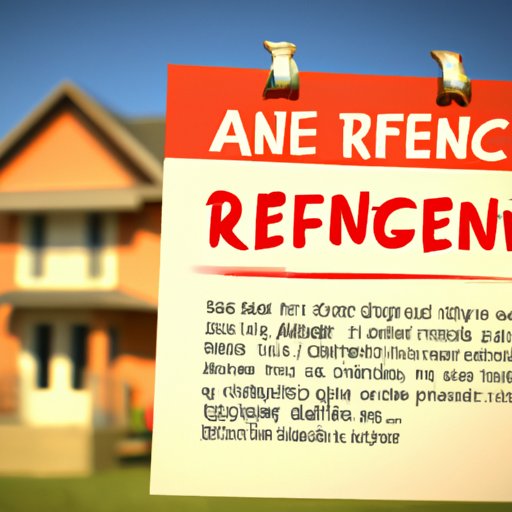Introduction
Refinancing is a process that involves taking out a new loan to pay off an existing loan. This often helps people save money by taking advantage of lower interest rates or better terms. But how much does it cost to refinance? In this article, we’ll explore the costs associated with refinancing a mortgage, estimate the price tag of refinancing your home, and provide tips for reducing refinancing costs.

Calculating the Cost of Refinancing: A Comprehensive Guide
When considering whether to refinance your mortgage, it’s important to understand the costs associated with the process. Knowing what to expect can help you make an informed decision about whether refinancing is the right choice for you.
Exploring the Costs Associated with Refinancing a Mortgage
The cost of refinancing will vary depending on your current loan terms and the lender you choose. Generally speaking, there are three main types of fees associated with refinancing: origination fees, closing costs, and prepayment penalty fees. Origination fees are charged by the lender for processing the loan application and typically range from 0.5% to 1% of the loan amount. Closing costs cover things like attorney fees, title searches, appraisals, and recording fees. These costs can range from 2% to 5% of the loan amount. Prepayment penalty fees are charged if you pay off your loan early. These fees are usually set at a certain percentage of the original loan balance and may vary depending on the lender.
Estimating the Price Tag of Refinancing Your Home
To estimate the cost of refinancing your home, you’ll need to calculate the total cost of the new loan, including all of the fees mentioned above. You should also consider other factors such as the length of time it will take to break even on the new loan. According to research conducted by the Consumer Financial Protection Bureau, “on average, borrowers who refinanced in the first quarter of 2020 paid $4,900 in upfront costs, including $2,100 in origination fees.”
How to Calculate the Cost of Refinancing
To calculate the cost of refinancing, start by adding up all of the fees associated with the process, such as origination fees, closing costs, and prepayment penalty fees. Then, subtract any fees you may be able to roll into the new loan. Finally, divide the total cost of the new loan by the amount you’ll save each month in principal and interest payments. This will give you an idea of how long it will take to break even on the new loan.

What You Need to Know About Refinancing and its Cost
Before deciding to refinance, it’s important to understand the types of fees involved and how much it will cost. Here’s what you need to know.
Types of Fees Involved in Refinancing
There are several types of fees associated with refinancing a mortgage. These include origination fees, closing costs, and prepayment penalty fees. Origination fees are charged by the lender for processing the loan application and typically range from 0.5% to 1% of the loan amount. Closing costs cover things like attorney fees, title searches, appraisals, and recording fees. These costs can range from 2% to 5% of the loan amount. Prepayment penalty fees are charged if you pay off your loan early. These fees are usually set at a certain percentage of the original loan balance and may vary depending on the lender.
How Much Does it Cost to Refinance?
The cost of refinancing will vary depending on your current loan terms and the lender you choose. To get an accurate estimate, add up all of the fees associated with the process, such as origination fees, closing costs, and prepayment penalty fees. Then, subtract any fees you may be able to roll into the new loan. Finally, divide the total cost of the new loan by the amount you’ll save each month in principal and interest payments to determine how long it will take to break even on the new loan.
Factors That Impact the Cost of Refinancing
In addition to the fees associated with refinancing, there are other factors that can affect the cost of the loan. These include your credit score, the type of loan you choose, and the amount you borrow. If you have a higher credit score, you may be able to qualify for a lower interest rate and save money over the life of the loan. Additionally, if you’re refinancing a larger amount, you may be able to negotiate lower fees with the lender.
The Benefits and Costs of Refinancing Your Mortgage
Refinancing your mortgage can be a great way to save money over the life of the loan. However, it’s important to weigh the benefits against the costs. Here’s what you need to know.
Pros of Refinancing
The primary benefit of refinancing is that it can help you save money over the life of the loan. By taking advantage of lower interest rates or better terms, you may be able to reduce your monthly payments and pay off your loan faster. Additionally, refinancing can help you access cash to pay for home improvements or other expenses.
Cons of Refinancing
Refinancing can be costly. As mentioned earlier, there are several fees associated with the process, such as origination fees, closing costs, and prepayment penalty fees. Additionally, if you don’t stay in the home long enough to break even on the new loan, you could end up losing money in the long run.
Conclusion
Refinancing a mortgage can be a great way to save money over the life of the loan. However, it’s important to understand the costs associated with the process. By calculating the total cost of the new loan, including all of the fees associated with the process, you can get a better idea of how much it will cost to refinance. Additionally, there are several ways to reduce the cost of refinancing, such as negotiating with the lender and rolling fees into the loan.
(Note: Is this article not meeting your expectations? Do you have knowledge or insights to share? Unlock new opportunities and expand your reach by joining our authors team. Click Registration to join us and share your expertise with our readers.)
